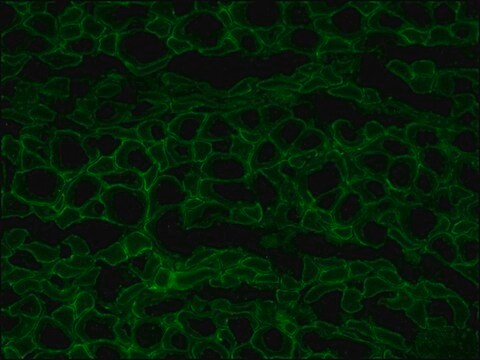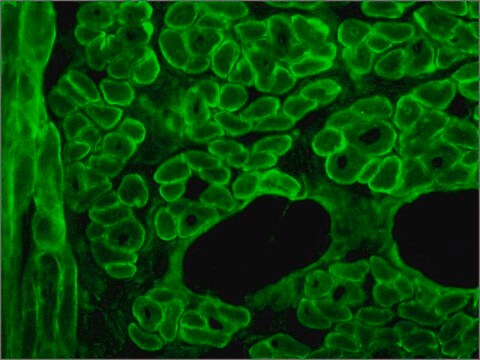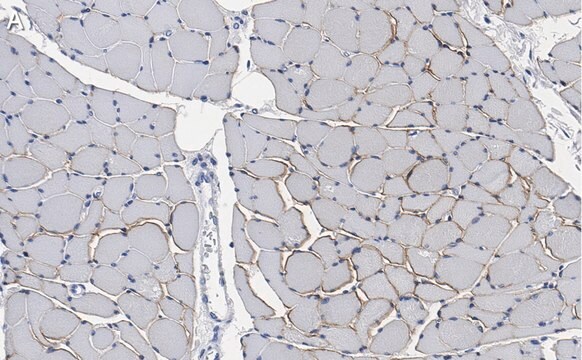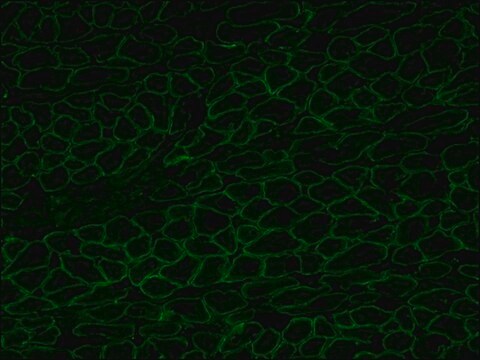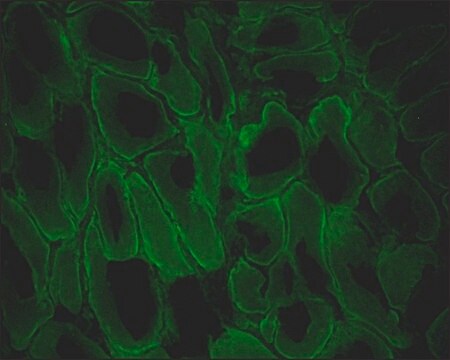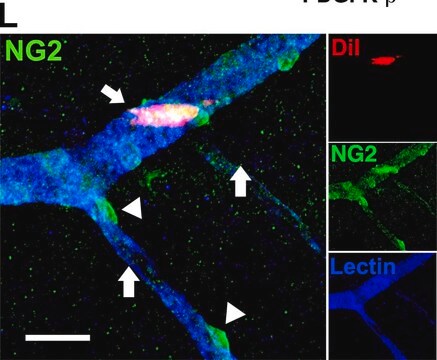추천 제품
생물학적 소스
mouse
Quality Level
항체 형태
purified antibody
항체 생산 유형
primary antibodies
클론
8C5, monoclonal
분자량
calculated mol wt 426.75 kDa
observed mol wt ~430 kDa
정제법
using protein G
종 반응성
mouse, human
포장
antibody small pack of 100
기술
immunofluorescence: suitable
immunohistochemistry: suitable
western blot: suitable
동형
IgG2aκ
에피토프 서열
Internal
단백질 ID 수납 번호
UniProt 수납 번호
저장 온도
2-8°C
유전자 정보
human ... DMD(1756)
특이성
Clone 8C5 is a mouse monoclonal antibody that detects the deletion prone region of Dystrophin. It targets an epitope within 295 amino acids from the internal region.
면역원
Recombinant human dystrophin fragment corresponding to amino acids 2145-2439 encoded by exons 45-50; as β-galactosidase fusion protein.
애플리케이션
Quality Control Testing
Evaluated by Western Blotting in Human muscle tissue extract.
Western Blotting Analysis: A 1:1,000 dilution of this antibody detected Dystrophin in Human muscle tissue extract, but not in HeLa cell lysate.
Tested Applications
Immunofluorescence Analysis: A representative lot detected Dystrophin in Immunofluorescence applications (Lim, K.R.Q., et al. (2022). Proc Natl Acad Sci USA. 119(9): e2112546119).
Western Blotting Analysis: A representative lot detected Dystrophin in Western Blotting applications (Lim, K.R.Q., et al. (2022). Proc Natl Acad Sci USA. 119(9): e2112546119).
Immunohistochemistry Applications: A representative lot detected Dystrophin in Immunohistochemistry applications (Lim, K.R.Q., et al. (2022). Proc Natl Acad Sci USA. 119(9) e2112546119).
Note: Actual optimal working dilutions must be determined by end user as specimens, and experimental conditions may vary with the end user.
Evaluated by Western Blotting in Human muscle tissue extract.
Western Blotting Analysis: A 1:1,000 dilution of this antibody detected Dystrophin in Human muscle tissue extract, but not in HeLa cell lysate.
Tested Applications
Immunofluorescence Analysis: A representative lot detected Dystrophin in Immunofluorescence applications (Lim, K.R.Q., et al. (2022). Proc Natl Acad Sci USA. 119(9): e2112546119).
Western Blotting Analysis: A representative lot detected Dystrophin in Western Blotting applications (Lim, K.R.Q., et al. (2022). Proc Natl Acad Sci USA. 119(9): e2112546119).
Immunohistochemistry Applications: A representative lot detected Dystrophin in Immunohistochemistry applications (Lim, K.R.Q., et al. (2022). Proc Natl Acad Sci USA. 119(9) e2112546119).
Note: Actual optimal working dilutions must be determined by end user as specimens, and experimental conditions may vary with the end user.
표적 설명
Dystrophin (UniProt: P11532; also known as DMD) is encoded by the DMD gene (Gene ID: 1756) in human. Duchenne muscular dystrophy is caused by mutations in DMD gene. Most subjects have out-of-frame deletions in the DMD gene that leads to lack of dystrophin in muscle. Dystrophin is a rod-shaped cytoplasmic protein and a vital part of a protein complex that connects the cytoskeleton of a muscle fiber to the surrounding extracellular matrix through the cell membrane. It is expressed in muscle fibers accumulating in the costameres of myoplasm at the sarcolemma. Its expression is also reported in brain, muscle, kidney, lung, and testis. Dystrophin is localized to the inner part of the muscle fiber cell membrane (sarcolemma), where it forms the dystrophin-associated glycoprotein complex (DGC) that links the extracellular matrix to the actin cytoskeleton. The N-terminus is the actin-binding domain, and the carboxy-terminal domain interacts with β-dystroglycan as well as dystrobrevin and the syntrophin. The central rod domain that comprises the major mass of the dystrophin molecule forms a flexible, rod-shaped structure. Dystrophin plays an important role in stabilizing the muscle fiber against the mechanical forces of muscle contraction by providing a shock-absorbing connection between the cytoskeleton and the extracellular matrix. The DMD gene is the largest known gene in humans and mutations in this gene are known to cause Duchenne muscular dystrophy, a sex-linked recessive disorder that affects males aged 3 to 7 year as proximal muscle weakness with steady progression. Clone 8C5 is generated from the deletion-prone region of the Duchenne muscular dystrophy gene. MANEX4850E corresponds to exons 48 to 50. Exon skipping studies have shown that phosphorodiamidate morpholino oligomers (PMOs) can convert out of-frame to in-frame mutations, which produce truncated, partially functional dystrophin. Seventeen different isoforms of Dystrophin have been described that are produced by alternative promoter usage and alternative splicing. (Ref.: Lim, KRQ., et al. (2022). Proc. Natl. Acad. Sci. USA. 119(9); e2112546119; Thanh, LT., et al. (1995). Am. J. Med. Genet. 58(2); 177-186).
물리적 형태
Purified mouse monoclonal antibody IgG2a in buffer containing 0.1 M Tris-Glycine (pH 7.4), 150 mM NaCl with 0.05% sodium azide.
재구성
1.0 mg/mL. Please refer to guidance on suggested starting dilutions and/or titers per application and sample type.
저장 및 안정성
Recommended storage: +2°C to +8°C.
기타 정보
Concentration: Please refer to the Certificate of Analysis for the lot-specific concentration.
면책조항
Unless otherwise stated in our catalog or other company documentation accompanying the product(s), our products are intended for research use only and are not to be used for any other purpose, which includes but is not limited to, unauthorized commercial uses, in vitro diagnostic uses, ex vivo or in vivo therapeutic uses or any type of consumption or application to humans or animals.
적합한 제품을 찾을 수 없으신가요?
당사의 제품 선택기 도구.을(를) 시도해 보세요.
Storage Class Code
12 - Non Combustible Liquids
WGK
WGK 1
Flash Point (°F)
Not applicable
Flash Point (°C)
Not applicable
시험 성적서(COA)
제품의 로트/배치 번호를 입력하여 시험 성적서(COA)을 검색하십시오. 로트 및 배치 번호는 제품 라벨에 있는 ‘로트’ 또는 ‘배치’라는 용어 뒤에서 찾을 수 있습니다.
자사의 과학자팀은 생명 과학, 재료 과학, 화학 합성, 크로마토그래피, 분석 및 기타 많은 영역을 포함한 모든 과학 분야에 경험이 있습니다..
고객지원팀으로 연락바랍니다.